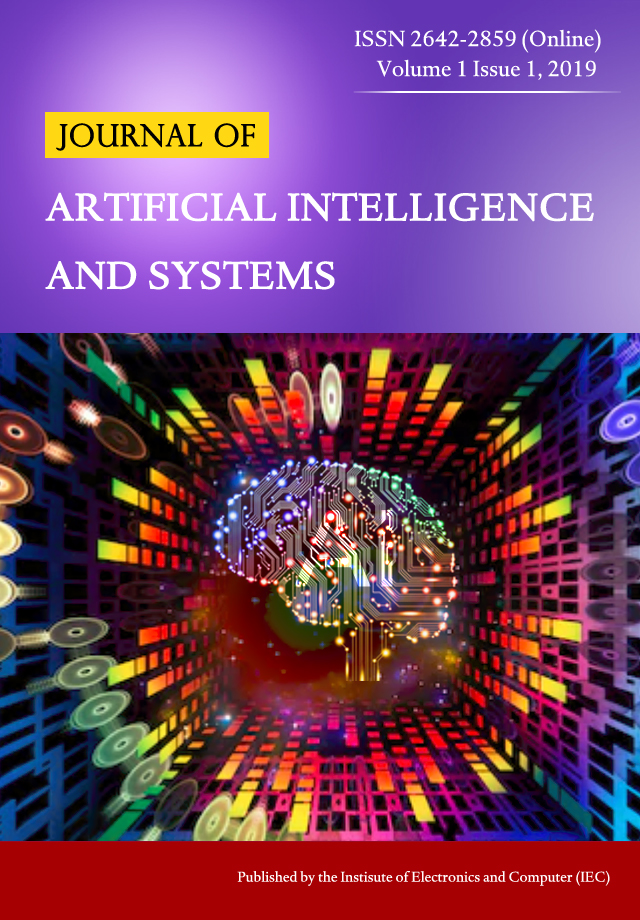
Journal of Artificial Intelligence and Systems
Editors-in-Chief: Prof. & SMIEEE, Victor Hugo C. de Albuquerque, Federal University of Ceará, Brazil
Prof. & FIEEE, Jinde CAO, Southeast University, China
Prof. Haiping Du, University of Wollongong, Australia
Co-Editor-in-Chief: Prof. & SMIEEE, Weiping Ding, Nantong University, China
Email: [email protected] ISSN: 2642-2859 (Online), No fees to publish articles in this journal
Paper Submission: https://editorone.org/management/manuscripts/create?publication_id=5e41e5e373f8e
Google Scholar: https://scholar.google.com/citations?user=4vr_Yn8AAAAJ&hl=en
1. Special Issue Title: Artificial Intelligence of Things for Sustainability
Submission Deadline: December 15, 2023 Publication Date: by January 16, 2024
Lead Guest Editor: Dr. Brojo Kishore Mishra, NIST Institute of Science and Technology, India.
Submission Method: Please directly send your article to [email protected]
Guest Editor: Dr. Sandipan Mallik, NIST Institute of Science and Technology, India; Dr. Akila D., Saveetha College of Liberal Arts and Sciences, India; Dr. Payal Bansal, Poornima College of Engineering, India.
Description:
Theme: The theme of the special issue is "Artificial Intelligence of Things for Sustainability." This theme focuses on how the synergy between AI and IoT technologies can be harnessed to address and advance sustainability goals. It explores the innovative applications, challenges, and opportunities at the intersection of AI, IoT, and sustainability.
Aims:
• Promote Sustainable Practices: The special issue aims to highlight how AI and IoT technologies can be used to promote sustainable practices in various domains, including energy, transportation, agriculture, urban planning, and more.
• Facilitate Interdisciplinary Research: Encourage interdisciplinary collaboration between researchers in AI, IoT, environmental science, and related fields to drive forward the development of sustainable solutions.
• Showcase Innovative Applications: Showcase cutting-edge research, case studies, and practical applications of AI and IoT in sustainability, illustrating their real-world impact.
• Address Challenges and Ethical Considerations: Discuss the challenges and ethical considerations associated with the use of AI and IoT in sustainability, including issues related to data privacy, security, and environmental impact.
Scopes:
The scope of the special issue encompasses a wide range of topics related to AI of Things for Sustainability, including but not limited to:
• Environmental Monitoring: How AI and IoT can be used to monitor and manage environmental parameters such as air quality, water quality, soil conditions, and wildlife tracking.
• Smart Cities: Explore how smart city initiatives leverage AI and IoT to enhance urban sustainability, including transportation optimization, waste management, and energy efficiency.
• Renewable Energy: Discuss AI-driven solutions for optimizing renewable energy sources, grid management, and energy consumption in residential and industrial settings.
• Agriculture and Food Systems: Examine applications of AI and IoT in precision agriculture, crop monitoring, livestock management, and supply chain optimization for sustainable food production.
• Biodiversity Conservation: Highlight AI and IoT contributions to wildlife conservation, including habitat monitoring, anti-poaching efforts, and species tracking.
• Health and Well-being: Investigate how AI and IoT technologies are used for improving healthcare and well-being, including telemedicine, remote patient monitoring, and environmental health tracking.
• Ethical Considerations: Address ethical concerns, data privacy, and security issues related to AI and IoT in the context of sustainability.
• Case Studies: Feature practical case studies and real-world examples of successful AI and IoT applications in sustainability.
• Policy and Regulation: Discuss the role of policies and regulations in promoting or hindering the adoption of AI and IoT for sustainability.
• Interdisciplinary Research: Encourage research that bridges the gap between AI, IoT, and sustainability, fostering collaboration among researchers from different domains.
Special Issues are an important component of IEC journals. They deal with more focused topics with high current interest falling within the scope of the journal in which they are published. They should be organized by recognized experts in the area and attract articles of the highest quality. Special Issue proposals are welcome at any time during the year.
Proposals for Special Issues should be submitted by the Lead Guest Editor of the Special Issue and should include the following:
Special Issue Title
Lead Guest Editor (Including full name, email address, affiliation information)
Guest Editor (Including full name, email address, affiliation information)
Note: Affiliation information should include your department, university, city and country or institution, city and country.
Submission Deadline
Publication Date
Description: A 150-400 words summary about your Special Issue
If you would like to propose a Special Issue and be the Lead Guest Editor, please download Proposal Form below, fill it out and send to [email protected].